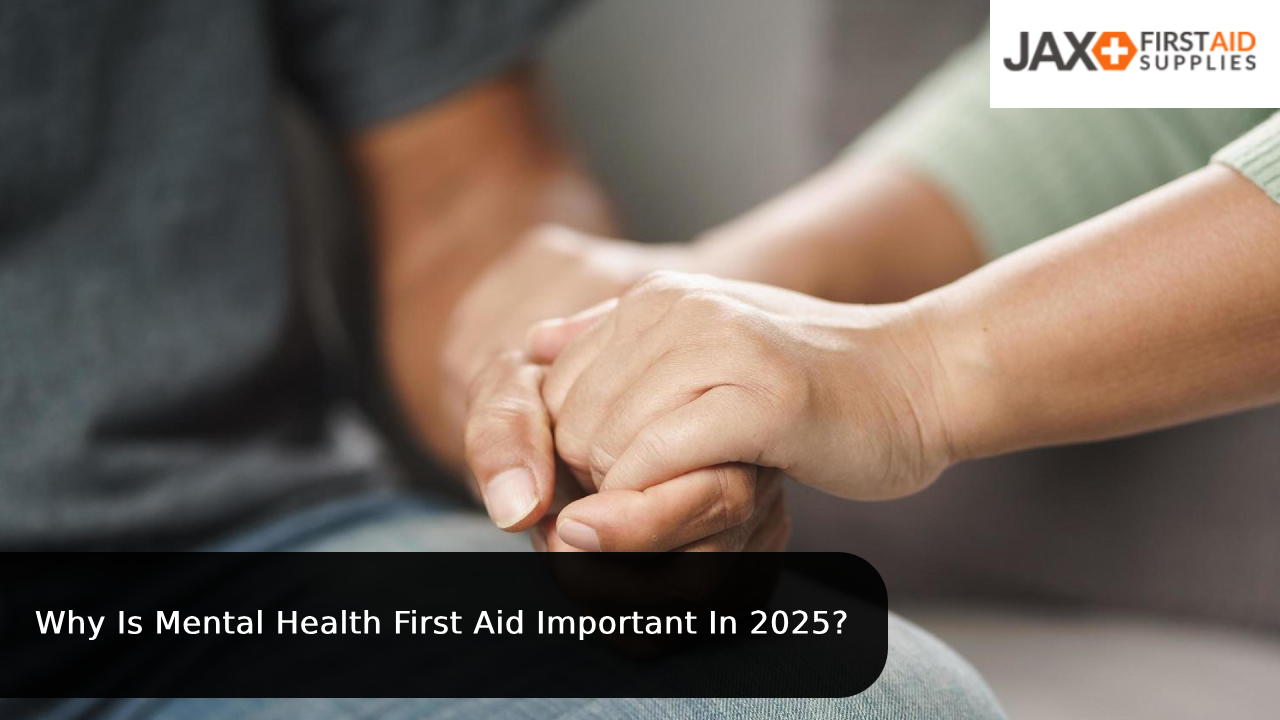Why Is Mental Health First Aid Important In 2026?
Published by Jax First Aid Supplies on 7th May 2025

Mental Health In 2026: A Brief Overview
Mental health is very important when it comes to overall wellbeing, however it remains one of the most misunderstood and under-addressed parts of health and safety in the workplace and beyond. In the past few years , UK businesses as well as communities have been making significant changes to that by creating more awareness of mental health first aid.
With national events such as Time For A Cuppa Week, Maternal Mental Health Month, Dying Matters Week, and Mental Health Awareness Month putting more eyes on emotional wellbeing and mental health, there’s never been a more important time to talk about how we can all support mental health more.
What is mental health first aid?
Mental Health First Aid (MHFA) alludes to the support given to someone experiencing a mental health issue or emergency before professional help can be available. Just like physical first aid, mental health first aid is all about early recognition, immediate response and assistance, and helping the affected individual get the right support.
In workplaces, schools, as well as community groups, Mental Health First Aiders are trained to spot the signs of common mental health conditions, such as anxiety, depression, panic attacks, and suicidal thoughts. They give a listening ear, create a safe space to talk, and direct people to the appropriate services or helplines.
Trained MHFA first aiders typically wear a mental health first aider badge, or mental health lanyard, which shows a recognisable symbol that makes it easier for staff or students to know who they can speak to in times of a mental health crisis.
Why mental health support is crucial in 2026
The mental health landscape in the UK:
According to Mind, 1 in 4 people will experience a mental health problem of some kind each year in England. As well as this, post-pandemic challenges, rising living costs, and increasing social isolation have only worsened the mental health crisis.
Events such as Time For A Cuppa Week encourage people to open up and check up with loved ones who either you may know are feeling isolated and depressed, or even those who seem fine can be struggling. A small conversation over a cup of tea or coffee can genuinely lead to life-changing outcomes for some people, especially when paired with certain resources like a mental health leaflet, which gives good guidance on spotting signs of mental health issues and offering support when needed.
Maternal mental health matters:
May 2026 marks Maternal Mental Health Month, which aims to raise awareness for issues such as postnatal depression and anxiety. According to the NHS, up to 1 in 5 women, and 1 in 10 men, develop mental health issues either during pregnancy or within the first year after giving birth.
It can be important and helpful to display key information, such as a mental health first aid poster in an easily visible and accessible place, for example staff rooms, clinics, and shared spaces.
Dying matters week:
From 5th–11th May, dying matters week reminds us of the large impact that grief and loss can have on mental health. Dying matters week helps to promote open conversations around death and dying, helping both individual people as well as organisations to support people facing bereavement.
Mental Health Awareness Month: Move Your Mind
This May, Mental Health Awareness Month is themed around movement, discussing how physical activity can support mental wellbeing. Movement can boost endorphins, help to reduce anxiety, and encourage people and communities. As an employer or employee in a workplace, this mental health awareness month, you could encourage active lunch breaks, walking meetings, and local initiatives.
How businesses can promote mental wellbeing
To support employees and their mental health, organisations can take very simple yet highly effective steps:
- Trained mental health first aiders: Ensure key staff, such as managers or higher ranked employees have training in MHFA techniques and are equipped with knowledge and tools.
- Creating a safe space: Create a workplace culture and safe space that destigmatises open mental health discussions.
- Having visible mental health resources: Use mental health first aid posters, mental health leaflets, and other signage to make help easily accessible for all staff.
- Encourage peer support: Within the workplace, simply promoting kindness, inclusivity, and listening can boost morale and mental health majorly.
- Keep wellbeing on the agenda: Include mental health in your workplace risk assessments, training programmes, and management check-ins.
Who should you talk to if you're struggling?
It is very important to know that you're not alone. If you, or someone you know is dealing with mental health difficulties, help is available:
- Samaritans: 116 123 (free, 24/7)
- Mind: 0300 123 3393
- NHS 111: For non-emergency support and advice
- Shout: Text ‘SHOUT’ to 85258 (free 24/7 crisis text line)
Employers should also provide these numbers in the workplace, best in the form of a mental health guidance card, in a clear, visible and accessible location for those who need support but may be afraid to ask.
Mental health is health
Whether it’s ‘Time For A Cuppa Week’ or ‘Mental Health Awareness Month’, or any day of the week, taking the time to understand, support, listen and talk can change - and even save - lives. Equip your workplace or school with the best resources, and mental health first aid supplies and help create a culture of compassion.







